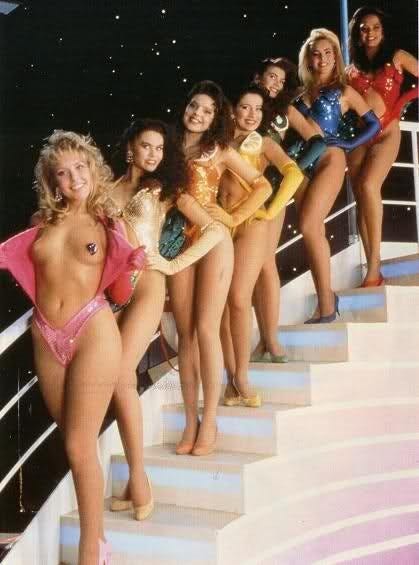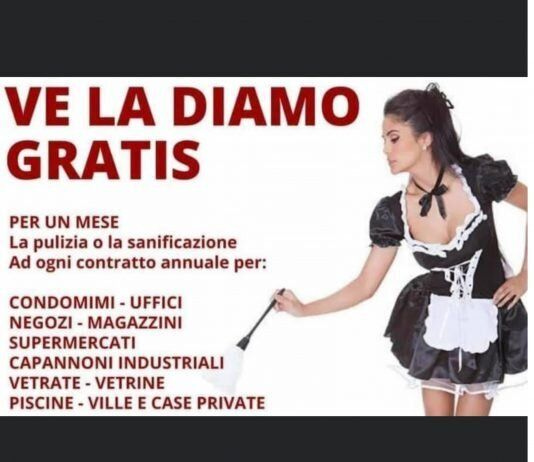Italy, I Love You, But Your Television Programming Is Appallingly Sexist
Women aren't just relegated to the background; they're fungible sex dolls who are rarely allowed to speak
The United States is capable of some truly awful television programming (Fantasy Island, The Love Boat, Falcon Crest, Dynasty, Dallas—need I go on?), but with the advent of cable and subscription services, especially original content producers like HBO, Hulu, Netflix, Apple+, Starz, and Showtime, a raft of brilliant shows have been produced that rival anything you can see on the big screen. The most unassailable ones, in my opinion, are The Wire, The Sopranos, Breaking Bad, Ozark, Severance, Fargo, True Detective, and most of Six Feet Under. For the sheer body of psychologically textured, impeccably art-directed, bingeable work, American entertainment remains unrivaled. I say this as someone with a hearty appreciation for foreign films, particularly Romanian New Wave, and a personal aversion to tent-pole franchises like Marvel Comics.
Yes, I know I’m alone on that one. Bad Stacey.
But then there’s Italy.
Italy abounds in talent. Fifty lesser countries were surely sacrificed to make one Italy. From artists to engineers, no one can touch the Italians. They exported their genius to all corners of the globe, single-handedly saving England from being a nation of ax-makers, playwrights and boiled-meat-eaters. Italian dancing masters, musicians, gardeners, fencing instructors, doctors, and dressmakers flooded Europe between the years of 1350-1850. “Talent for export,” a very smart friend of mine calls the phenomenon, which is why many of us are puzzled by the appalling banality, sexism, and misogyny of a lot of Italian television. It doesn’t have to be that bad, but it is.
The problem, of course, is the same one that a lot of countries grapple with, which is there are too many men in charge of the decision-making. Study after study shows that mixed-gender business teams are more egalitarian and perform better in terms of sales and profits. But I’m guessing that the executives at Italian television stations didn’t get that memo, because it’s been one awful show after another, beginning from about the late 70s on, featuring bare-breasted women standing around a soundstage who are never allowed to speak.

Some of you reading this are thinking, why that’s rich, coming from you, Stacey. Hypocritical much? But I’m not. If there were just as many young, scantily clad men on these shows, I would chalk it up to cultural preference. As things stand, it’s not a cultural preference; it’s an egregious amount of sexism.
Women are rarely allowed to weigh in as an authority on any subject. They can be amusing and provocative, but never substantive. Italians love talk shows, and yet the handful of female commentators I see there are only good at starting brawls and being divisive. Few are allowed to express any nuanced opinions. Time was your average Italian could turn on the television and watch political and cultural analysis. Now, it’s all gossip, backbiting, and fighting between the genders.
Showgirls used to be the exclusive province of game shows. There’s always some ancient comedian cracking sexist jokes with leggy teenagers bouncing around behind him. Now, half-naked women everywhere, including the evening news. I realize that the charm of Italy is that it never changes, but this is next level sexism, and millions of Italian women find it deeply disturbing.
Four-time prime minister Silvio Berlusconi (a man often referred to, not unfairly, as “Italian Trump”) was the progenitor of trash television. In 1984, thanks to Prime Minister Bettino Craxi issuing a decree allowing private networks to broadcast all over Italy, Berlusconi was able to start his television empire. Before him, television was all state-run, buttoned-up, and “morally edifying” due to the political influence of the Catholic Church. Now, fierce competition sprang up between state-TV and Berlusconi-TV, each one vying for bigger audience share. Television was no longer edifying or even educational; it was all boobs, all the time, one show after another, as though designed for Berlusconi’s grabby little eyeballs alone. Unfortunately, the first rumblings of female emancipation in Italy in the 70s came with an almost compulsive eroticization of the female body—one that is just as firmly entrenched today.
Colpo grosso (“big shot”) was one of Italy’s more successful gameshows, airing on Italia 7 for five seasons from 1987 to 1992. The premise was to answer questions on a faux-casino stage set and earn “strip chips,” which could be used to make the other player undress. Pretty soon, male undressing was eliminated, and it was exclusively about getting female contestants to take their clothes off. If that wasn’t sufficient reason to watch, the producers added Ragazze Cin Cin, or showgirls, who could be strip-chipped into performing strip teases of their own.
Despite the consciousness-raising heroism of women like activist/author/teacher Lorella Zanardo, whose documentary Il Corpo delle Donne (“The Body of Women”) set the nation on fire, things are slow to change. Four months ago, a security firm in Naples posted a labor advert for a receptionist, “no older than thirty, with a sunny character and attractive appearance. We ask that you send a full photo in a bathing suit or similar.” The ad sparked such outrage, the Italian Labor Ministry had to open an investigation.
The job was for 500 euros a month, by the way. Italian women make, on average, 27% less than their male counterparts.
This galling sexism was hardly a one-off. TV show Detto Fatto (“No sooner said than done”), recently featured a tutorial on pushing a supermarket cart through a grocery store in the most seductive way possible. The instructor in this case was a pneumatic young woman wearing a pair of high heels and leather shorts who showed women how to look sexy while picking up items dropped on the floor. Mind you, this was just before the International Day for the Elimination of Violence Against Women.
All Italians are forced to pay a broadcasting fee called a Canone Rai, which is used to subsidize public television stations Rai 1, Rai 2, and Rai 3. It comes to about $120 a year, and must be paid regardless of whether those channels are used by a household or not. Even subscribers in furnished apartments who don’t own the television are required to pay it. People living abroad but with a home in Italy are required to pay it. And just to make sure that the fee is collected, Italy incorporates it into the electricity bill. If you want electricity, you’d better pay your broadcasting fee.
Late last year, the Italian Parliament approved a law banning sexist and discriminatory advertising, which is a good first step. Like the U.S., Italy has its share of anti-abortion zealots who are fond of plastering the streets with posters of aborted fetuses. Abortion has been legal in Italy since 1978, and while the law doesn’t specifically refer to abortion, it encompasses it in a way that will block this kind of misogyny.
Fortunately, it will also take aim at billboards like this one in Lizzanello, a town in Puglia, depicting a woman dressed as a French maid offering her services. Ve la diamo gratis, it reads—”We give it to you for free.”
Here is a subtitled look at The Body of Women, which I urge you to watch since it states its case so eloquently. Italy has a long way to go before real parity is achieved. But it needs to start with the most visible aspects of sexism, which are on television.
What are your thoughts? Even if you’ve never watched Italian television, you might have an opinion on the harm this kind of programming has on Italians. Leave your comments below.
Copyright © 2022 Stacey Eskelin






Hi Stacey, thank you for writing this. I'm Italian and I grew up watching Berlusconi's TV. All my female friends and I have suffered of body dysmorphia at some point. Deep down, even if we've learned to accept our bodies by now, we still consider ourselves fat, no matter how much effort we put in at the gym or how many diets we try. A constant struggle and self-delusion. I do believe that Berlusconi's TV played a key role in ensuring we don't feel at ease with how we look, ever.
I suppose in a way it can be related to the popularity of reality television here in the US. Reality TV is cheaper and easier because you don't have a written script or rehearsals. You turn on the camera, let it run, and edit in post-production. It makes for some crappy television, but a preponderance of boobs will make a lot of guys forget just how bad a show is.
Yes, men are pigs. Some of us aren't proud of it.